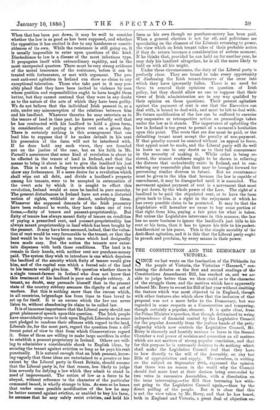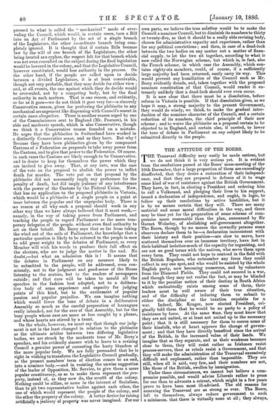THE CONSTITUTION AND THE DEMOCRACY IN VICTORIA.
SINCE we last wrote on the fascination of the Plaiscite for the people of Victoria, the Victorian "Hansard," con- taining the debates on the first and second readings of the Constitutions Amendment Bill, has reached us, and we are able to judge better than we then could as to the character of the struggle there, and the motives which have apparently induced Mr. Berry to recast his Bill of last year without omitting the feature which was most objected to in England, though with other features also which show that the inclusion of that proposal was not a mere bribe to the Democracy, but was regarded in some respects as a Conservative and tempering, though certainly a popular, element. It is quite clear, from the Prime Minister's speeches, that though determined to wring independence of financial control by the Legislative Council for the popular Assembly from the jealous hands of the petty oligarchy which now controls the Legislative Council, Mr. Berry is sincerely and heartily anxious to leave in the Second Chamber a real power of revision and correction on all matters which are not matters of strong popular conviction, and that for this purpose he is extremely desirous to do nothing which shall make the Legislative Council feel that they have to bow directly to the will of the Assembly, on any but Bills of appropriation and supply. We ourselves, in writing on the subject on September 20th, expressed the opinion that there was no reason in the world why the Council should feel more hurt at their decison being over-ruled by two votes in successive Assemblies, with a dissolution on the issue intervening,—the Bill then becoming law with- out going to the Legislative Council again,—than by the direct polling of the people. But it is clear that this is not the view taken by Mr. Berry, and that he has heard, both in England and Victoria, a great deal of objection ex- pressed to what is called the "mechanical" mode of over- ruling the Council, which would, in certain cases, turn a Bill into an Act of Parliament by the act of a single branch of the Legislature, the other co-ordinate branch being com- pletely ignored. It is thought that if certain Bills became law by the will of one branch of the Legislature, the other being treated as a cypher, the respect felt for that branch which was not even consulted on the subject during the final legislation would be lowered in the colony, and that the Legislative Council, however constituted, would lose authority in the process. On the other hand, if the people are called upon to decide between a divided Legislature, it is at least conceivable, though not very probable, that they may decide for either view ; and, at all events, the one against which they do decide would be over-ruled, not by a competing body, but by the final authority in such matters. That is one reason, and evidently, so far as it goes—we do not think it goes very far—a sincerely Conservative reason, given for preferring the plebiscite to any mechanical arrangement like dispensing with Council's assent in certain cases altogether. There is another reason urged by one of the Commissioners sent to England (Mr. Pearson), in his able and moderate speech, which is also Conservative, though we think it a Conservative reason founded on a mistake. He urges that the plebiscites in Switzerland have worked in a distinctly Conservative sense, and so they have. But why ? Because they have been plebiscites given by the component Cantons of a Federation on proposals to take away power from the Cantons, and to give that power to the Federation. Of course, in such cases the Cantons are likely enough to be Conservative, and to desire to keep for themselves the power which they are invited to give away. That, at any rate, was the case of the vote on the proposal to abolish the power to inflict death for murder. The veto put on that proposal by the plebiscite did not necessarily imply any preference for the penalty of death, but did imply jealousy of any interference with the power of the Cantons by the Federal Union. Now, that has no application to the proposed plebiscite in Victoria, 'which would be a plebiscite of a single people on a point at issue between the popular and the unpopular body. There is quo reason at all why such a proposal should work in any other way than we have always believed that it must work,— namely, in the way of taking power from Parliament, and teaching the people to regard Parliament as the mere tem- porary delegates of the people, without even final authority to act on their behalf. Mr. Berry says that so far from taking the wind out of the sails of Parliament, the knowledge that a particular question is likely to be referred to the people is sure to add great weight to the debates of Parliament, as every Member will wish his words to produce their full effect on the electors, who are to judge the matter in the end. No doubt,—but what an admission this is ! It means that the debates in Parliament on any measure likely to be submitted to the people, will be addressed, even con- sciously, not to the judgment and good-sense of the House listening to the orators, but to the readers of newspapers outside ; and that care will be taken to mould all the speeches in the fashion best adapted, not to a delibera- tive body of some experience and capacity for judging points of this kind, but to the excitement of popular passion and popular prejudice. We can imagine nothing which would lower the tone of debate in a deliberative Assembly so much as the careful preparation of harangues really intended, not for the ears of that Assembly, but for the busy people whose ears are more or less caught by a phrase, and whose hearts are stirred by a taunt. On the whole, however, we must say that though our judg- ment is not in the least changed in relation to the plebiscite as the ultimate arbiter between two differing legislative bodies, we are struck by the moderate tone of Mr. Berry's speeches, and his evidently sincere wish to leave to a revising Council a genuine power of correcting the hasty blunders of the more popular body. We are fully persuaded that be is right in wishing to transform the Legislative Council gradually, as the present members' term of election comes to an end, into a nominee body,—and in resisting the unwise suggestion of the leader of Opposition, Mr. Service, to give them a more popular constituency, so as to make them represent the pro- perty, instead of, as they now do, the wealth of the colony. Nothing could be sillier, or more in the interest of Socialism, than to pit two representative bodies against each other, the one of which would represent the people of the colony, and the other the property of the colony. A better device for raising artificially a jealousy of property was never imagined. For our own parts, we believe the true solution would be to make the Council a nominee Council, but to diminialr its numbers to thirty or twenty-five, so that it should be a really able revising body, chosen for administrative capacity and experience, rather than for any political convictions ; and then, in case of a dead-lock between the two bodies on any matter not a matter of finan- cial supply, to let the two sit together, according to what is now called the Norwegian scheme, but which is, in fact, also the French scheme, in which case the Assembly, which con- tains eighty-six members, could, of course, if a sufficiently large majority had been returned, easily carry its way. This would prevent any humiliation of the Council such as Mr. Berry evidently dreads, and, taken together with the proposed nominee constitution ,of that Council, would render it ex- tremely unlikely that a dead-lock should ever even occur.
It is now clear that there must be a dissolution, before reform in Victoria is possible. If that dissolution gives, as we hope it may, a strong majority to the present Government, they would do wisely, we think, to make the gradual intro- duction of the nominee character of the Council, and a certain reduction of its numbers, the chief principle of their new scheme ; and to waive the plebiscite as a proposal certain to be objected to in England, and certain also, if carried, to lower the tone of debate in Parliament on any subject likely to be submitted directly to the people.



































 Previous page
Previous page